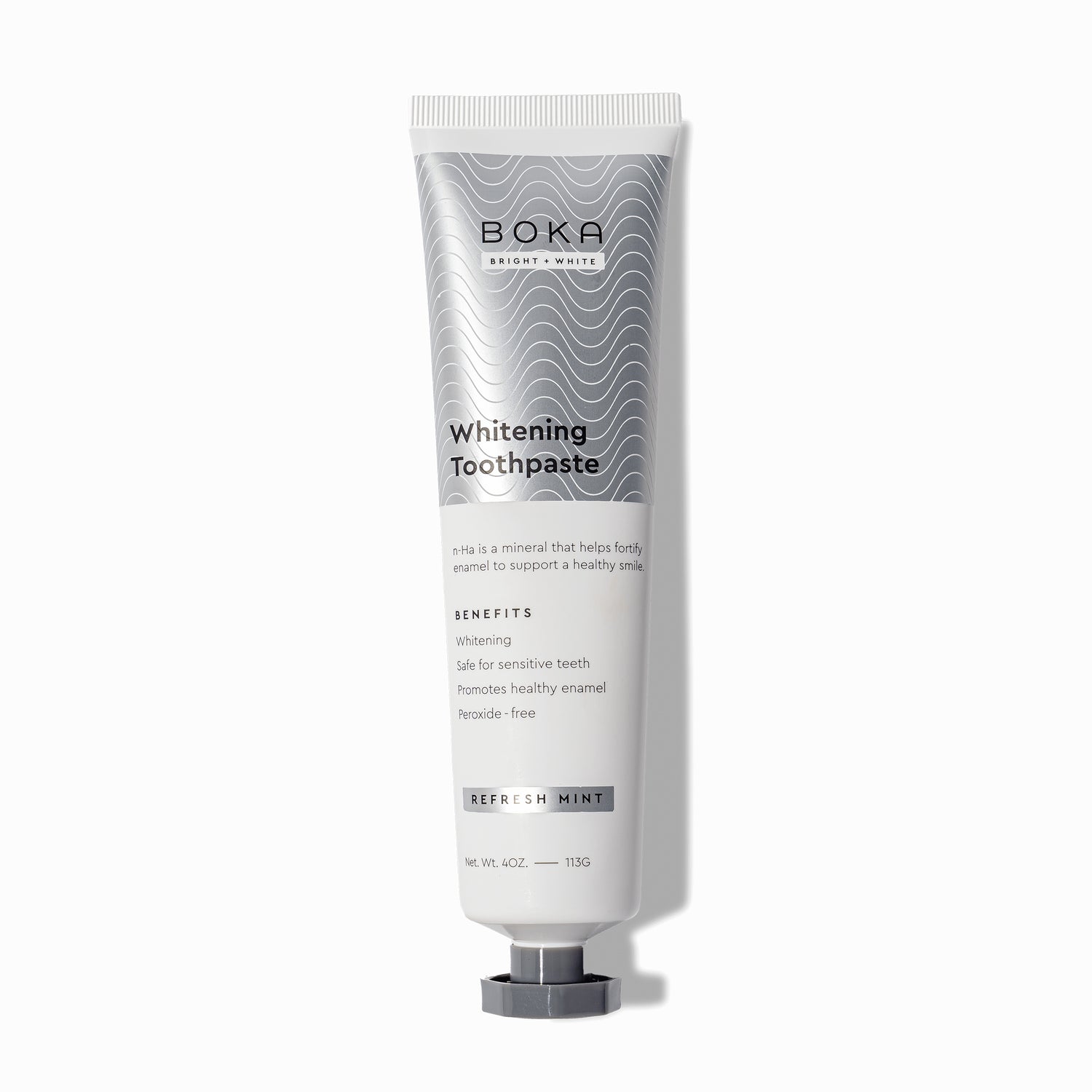You’ve just finished flossing and brushing your teeth, or maybe you're looking for a quick refresh after a coffee. What better way than a quick mouthwash rinse? The only thing is, you experience that all too common burning sensation after using mouthwash.
Whilst there are many benefits to mouthwash, including removing bad bacteria and freshening our breath, the common burning sensation can be off-putting.
In this article, we'll explain why you may be experiencing a burning sensation when using mouthwash and what you can do about it.
Let's get into it!
The Culprits Behind the Burn
The most common cause of mouthwash burn is, unsurprisingly, the ingredients used to make the mouthwash.
Many of these ingredients are commonly used to make mouthwash and are likely the culprit behind the burn. Knowing which ones are most likely to cause that stinging burn will help you avoid them in your next mouthwash purchase.
1. Alcohol
Alcohol is the most common culprit when it comes to mouthwash burns. Alcohol is a strong agent which can cause a burning sensation for a number of reasons, such as:
- Dehydration: Alcohol dries out the surface of your gums, resulting in dehydration and more sensitivity, which can also cause a burning sensation
- Nerve pain: When alcohol comes in contact with microscopic, exposed nerves in your mouth, it can cause an uncomfortable burning sensation
- Small cuts: Many of us have small cuts and abrasions in our mouths that go unnoticed. However, when alcohol comes in contact with these small injuries, it can cause a burning sensation.
Although a burning sensation is a common side effect of using mouthwash that contains alcohol, alcohol can be a useful agent. It helps to disinfect and kill the bacteria in your mouth, which can cause cavities and contribute to bad breath.
2. Essential Oils
While essential oils such as menthol, peppermint, spearmint oil, and eucalyptus oil are highly regarded for the flavor and freshness they provide, they can cause irritation and burning in some people.
People with conditions such as sensitive gums, dry mouth, or sores can experience a burning sensation due to the presence of essential oils in the mouthwash.
For other people, the intense cooling effects of oils such as menthol and peppermint can sometimes be interpreted as burning.
3. Hydrogen Peroxide
You may be surprised to learn that mouthwash can contain hydrogen peroxide, especially those that are designed to whiten your teeth. This is because hydrogen peroxide helps to lift stains off teeth, leaving them whiter than before.
However, it is important to know that hydrogen peroxide is a strong chemical that can irritate your teeth and the soft tissue in your mouth, such as your gums. This irritation can often be felt as a burning sensation and tooth sensitivity.
The burning sensation felt after using mouthwash containing hydrogen peroxide is particularly common if you use the mouthwash too frequently or for long periods of time.
Other Factors that Increase the Burn
You may have noticed that other people who use the same mouthwash as you may not feel any burning whatsoever. Or maybe you’ve never previously felt any burning sensation, and now, all of a sudden, you do.
There are a few reasons why burning sensations after using mouthwash develop or get worse.
Pre-existing Conditions
Pre-existing conditions that never usually bother you and may not even be noticeable can often exacerbate the burning sensation you feel after using mouthwash.
There are 3 main pre-existing conditions that can result in or worsen the burning sensation you feel after using mouthwash: Canker sores, gum inflammation, and dry mouth.
1. Canker Sores/Ulcers
Canker sores, also called mouth ulcers, can form almost anywhere in your mouth. They are small wounds that are extremely sensitive to ingredients found in many mouthwashes, such as alcohol, certain essential oils, and hydrogen peroxide.
They can cause a strong stinging and burning sensation in these regions of your mouth.
2. Gum Inflammation
Gum inflammation, or general gum diseases, can cause sensitivity, bleeding, and overall pain. This tenderness can be exacerbated by certain ingredients in mouthwash, which produces a burning sensation in the gums.
Advanced gum disease can also cause the gums to pull away from the base of your teeth, exposing nerves. These exposed nerves are extremely sensitive to certain irritants found in some mouthwashes, causing a painful, often burning sensation.
3. Dry Mouth
Dry mouth, which is often caused by a lack of saliva, makes your mouth much more sensitive to potential irritants found in mouthwash.
Without the buffering effects of saliva, the drying effects of hydrogen peroxide and alcohol can become intense and result in a burning sensation.
Mouthwash Strength
No two mouthwashes are made the same. The composition of mouthwash will often dictate how severe the burning sensation is.
Cosmetic mouthwashes, which are made to quickly freshen breath but are not intended to treat oral health issues, often contain alcohol, as well as menthol, which helps to freshen breath. Whilst they can cause burning sensations, they are usually milder than therapeutic/medical mouthwashes.
Therapeutic mouthwashes, which are made to target certain oral health concerns, are often stronger or contain other agents that are more likely to cause burning. These mouthwashes can contain ingredients such as chlorhexidine, which is used to treat certain gum conditions, for example, and often causes a burning sensation.
What to do about Mouthwash Burn?
Mouthwash burn can be frustrating, especially when you are trying your best to establish and maintain a consistent oral healthcare routine.
Thankfully, there are a few small adjustments you can make which will reduce and hopefully eliminate the burning sensation.
1. Switch to Alcohol-Free Formulas
Alcohol-free mouthwashes are widely available and are one of the easiest ways to eliminate mouthwash burns. They are also just as effective as their alcohol containing counterparts.
Additionally, alcohol-free formulas can be gentler on your teeth and gums.
2. Use Hydroxyapatite Mouthwashes
Whilst it is tempting to use formulas containing hydrogen peroxide that promise to whiten your teeth, they can often cause a burning sensation in your mouth.
Switching to formulas that do not contain hydrogen peroxide is a great way to alleviate the burning you feel from these mouthwashes.
A good alternative is hydroxyapatite, which works to whiten your teeth by filling microscopic pores on the surface of your teeth, which can make your teeth appear yellow. Some newer generation mouthwashes contain this ingredient, which mimics the bio composition of your natural teeth whilst whitening them, unlike hydrogen peroxide.
3. Dilute Concentrated Mouthwash
If you have already tried switching out to a more gentle mouthwash formula but find yourself still suffering from a burning sensation, it may be that the mouthwash is too concentrated for you.
Mouthwash can be diluted with water whilst maintaining most of its effectiveness. Diluting your mouthwash with water will act as a buffer and should alleviate any burning sensation. Slowly add water to your mouthwash, and stop until you can use it without experiencing any burning sensation.
4. Consider Flavor Alternatives
Sometimes, something as simple as changing to a more mild flavor helps to alleviate the burning sensation you may feel from flavors such as menthol.
For example, changing from menthol or peppermint to milder spearmint will often make for a more gentle cleansing experience without the burn.
5. Consult a Dentist
If the burning sensation you experience after using mouthwash is severe or persistent, then it is important to consult a dentist.
If the burning you feel is severe or has been going on for a long period of time, it may be a sign that you have an underlying dental condition that is being exacerbated by mouthwash. It is often best to get this checked by a dentist before it worsens.
A dentist will also be able to recommend a mouthwash that is milder and suitable for your needs.
Expert Advice
The proper oral hygiene routine is what Dr. Anjum Chaudhary, BDS, MDS, refers to as “FRBR: floss, rinse, brush, and repeat.
When you have a dry mouth or a condition known as xerostomia, it is recommended that you use a mouthwash that does not include alcohol. If you do not have a dry mouth and do not mind experiencing a slight stinging sensation, you should use a mouthwash that contains alcohol.
Each type of mouthwash has a unique set of advantages that can assist in enhancing your oral health and warding off tooth decay.
The effectiveness of a mouthwash depends on the individual who is using it, but certain mouthwashes are more effective than others.”
Conclusion
If you find that using mouthwash is a painful experience and results in a burning sensation, it is likely either due to the ingredients in the mouthwash or an underlying dental condition.
Ingredients such as alcohol, essential oils, and hydrogen peroxide can often result in a burning sensation because they can cause irritation, dehydration and trigger nerve endings. However, if you are experiencing severe or persistent burning, it is best to see a dentist, as it may be a sign of a condition that is being triggered by the mouthwash.
It is also important to note that burning sensations do not mean the mouthwash is effective; instead, they are a sign to switch to a milder formula.
If you are looking for a gentle alternative that can still achieve breath freshness and promote oral hygiene, give our Restore Mouthwash Tablets a try.
Available in mild yet refreshing flavors, the mint, green tea, and lemongrass tablets freshen breath, soothe irritated gums, and help to remineralize teeth — all without the burn.


